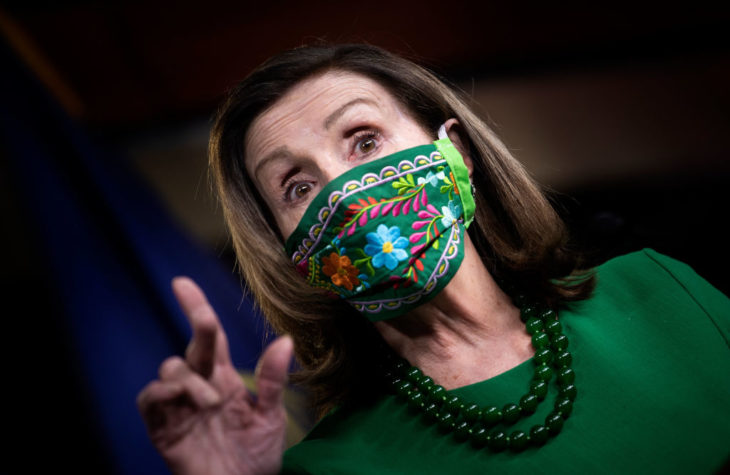Deal or no deal?
When is a deal not deal? When it’s the negotiations over Build Back Better among Capitol Hill Democrats. For days, party leaders have been talking up the progress they have reportedly made. Over the weekend, the administration openly contemplated the possibility of putting a framework agreement in place before the president jets to Europe on Thursday to meet the Pope and thrash out a climate commitment with world leaders in Glasgow.
But there is scant evidence to suggest Democrats are anywhere near the white-smoke moment when it becomes clear that Biden, Nancy Pelosi and Chuck Schumer have secured the votes they need.
In fact, most indicators point in the other direction.
The status of the billionaires’ tax proposal mooted on Monday (and discussed in yesterday’s email) remains shaky. On the days when moderates are happy, progressives start to throw their weight around. And vice versa. Biden is capable of having successful discussions with one camp but what good those meetings will generate is instantly offset by an equal and opposite amount of discontent on the other side of the party’s divide.
To put it bluntly, there is no agreement on what to spend Build Back Better money on or how to pay for it.
“Everything is under negotiation,” said Joe Manchin yesterday.
Senator Jeff Merkley was just as open about the gaps that remain between the two sides: “There’s just huge pieces of this that are not nailed down. So each time I hear ‘Well, it’s almost done,’ I don’t know what the hell people are talking about.”
There isn’t even agreement on the sequencing of the passage of the twin pieces of legislation. As of this morning, Pelosi finds herself at odds with House progressives over whether or not a framework deal on Build Back Better is enough to bring about a House vote on its sister legislation, the infrastructure bill.
Optimistic Democrats will tell you that negotiations always go a little like this, that it is always darkest before the dawn and a deal is just around the corner. But whenever it looks like progress has been made, possible holdouts — whether that’s “Manchinema” on the right or Sanders and company on the left — suddenly get a lot more demanding.
The chasm between the two wings of the Democratic party hasn’t disappeared. It may have narrowed, but not by much. And no amount of upbeat prognosticating from Pelosi or the White House can will it out of existence.
*** Sign up to receive the DC Diary in your inbox every weekday ***
Bail fail
In a contest for the stupidest policy idea to enter the mainstream of American politics in recent years, it’s hard to see anything beating “defund the police” for the top prize.
When I interviewed former New York police chief Bill Bratton this summer, he described “defund the police” as “one of the stupidest phrases ever conducted.” Many of the cities that heeded activists’ calls to “reimagine” public safety and cut police budgets last summer have subsequently reversed course in the face of a growing violent crime problem.
New polling from Pew confirms what has been obvious for some time now: that the American public really, really doesn’t like the idea of reducing police funding. When asked what they want to see happen to spending on policing in their area, 47 percent of Americans say they want it to increase and 37 percent say they want it to stay about the same. Nine percent want it “decreased a little” and just 6 percent say they want it decreased “a lot,” a proxy for “defund.”
With violent crime rising nationwide and law and order creeping up lists of voters’ top priorities, you might think that all but the most hardline progressives would run a mile from the basket of policies associated with the toxic slogan.
It is odd, then, that the White House has called for an end to cash bail for violent criminals. As the Washington Free Beacon’s Joseph Simonson reports, the proposal is part of the president’s Gender Policy Council’s National Strategy on Gender Equity and Equality.
Scrapping cash bail may not be the same thing as defund the police, but it is high on the policy wishlist of those in the vanguard of the Defund movement. It is also the source of frequent outrage in cities where violent criminals on parole go on to reoffend. A study in San Francisco found that half of those who were released in the city before trial were accused of a new crime while free.
Joe Biden owes his presence in the White House to the fact that he spent the Democratic primary eschewing the trendy ideas of the woke left. So what to make of the fact that his administration has embraced the idea of an end to cash bail? Was the Biden campaign a con?
What this proposal, and others like it, reveal is just how firm a grip the dogma of the progressive left — whether on criminal justice reform, immigration or questions of sex and gender — now has on the Democratic party. Biden really was the moderate option, but only relative to the alternatives. And if you need to fill an administration with Democratic appointees these days, you are unavoidably staffing the government with middle-ranking officials who are fully on board with the mainstays of woke orthodoxy, whether or not the president himself understands them, let alone believes in them.
Sleeveless in the Senate
Last night, Joe Biden attempted to paint Glenn Youngkin as a Trumpy extremist “in a fleece vest.” Meanwhile, Kyrsten Sinema oversaw Senate proceedings in a sleeveless denim vest, hardly the sartorial norm for the chamber. The Arizona senator’s wardrobe choices have always been a sign of her independent streak. In the world of pantsuits and and muted neutrals that is Washington womenswear, Sinema frequently opts for bolder options.
But what to make of her latest look? Arms out for reconciliation? A show of solidarity with blue-collar Americans struggling to keep up with rising prices? At such a fraught moment in spending negotiations, the people deserve an answer.
Fright night in Arlington
Kudos to Cockburn, who braved an icy autumnal wind and, more impressively, a Joe Biden stump speech for Terry McAuliffe in Arlington last night. The things my colleagues do to bring you the news, dear reader.
As Cockburn reports, the event was a demonstration of the project fear that the Democrats have settled on as their anti-Youngkin strategy. He writes: “The specter of Donald Trump was the main scare tactic most of the Democrats deployed to give their gathered supporters the willies.”
But the rally’s closing moments were also a reminder one of the most important — and unanswered — questions in the race for the Virginia governorship: why can’t McAuliffe’s aides get him to stop dancing?
What you should be reading today
Amber Athey: Inside a Loudoun County school board meeting
Christopher Sandford: Nick Kristof and a tale of two Oregons
C.A.E. Goodhart: The numbers game
Aaron M. Renn, Governing: The poor places that make our cities richer
Kara Swisher, New York Times: Beyond Zuckerberg
Charles McElwee, RealClearPolitics: Working-class voters will shape PA’s political future
Poll watch
President Biden Job Approval
Approve: 42.2 percent
Disapprove: 52.1 percent
Net approval: -9.9 (RCP Average)
Virginia Governor’s Race
Terry McAuliffe (D): 46 percent
Glenn Youngkin (R): 45 percent (USA Today/Suffolk)


















